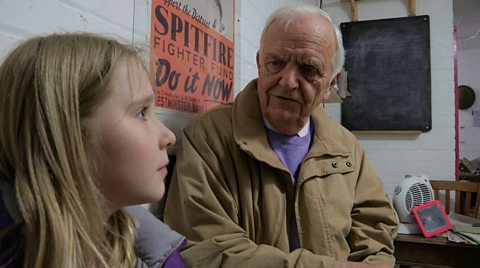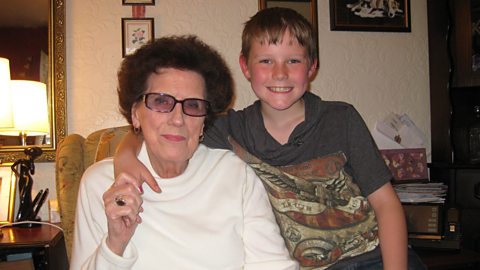Sarah:They told us that Britain had declared war on Germany.
Alan:I used to go home looking up to the sky and hoping I would see a dogfight.
Mrs Campbell:It was like one big adventure.
Mrs Campbell:That's your great granddad.
Anesha:Yeah.
Mrs Campbell:And we called him Amin the Butcher, because that's where we used to get all our meat.
Anesha:Yes.
Anesha:That's me, Anesha. I'm 11. And this is Mrs Campbell. She's 78. She's been a family friend for many years.
Mrs Campbell:Do you remember Nana Lily?
Anesha:Yeah.
Mrs Campbell:You must take after her, Anesha.
Anesha:Yes.
Anesha:Mrs. Campbell was five at the start of World War II, and lived with her mum and dad.
Mrs Campbell:This was my dad. And his name was Simon. And he was born in Jamaica and came over into the country. He was in the merchant navy.
Anesha:Mrs. Campbell's dad would go away on ships for up to two years at a time. They carried goods like food, coal, and oil. His job became even more important during the war as Britain relied on these things to survive. The family lived in Bute Town, close to Cardiff docks in South Wales. The docks were targeted, along with many big cities, by enemy bombing raids. Over 2,000 bombs fell on Cardiff during the war, and hundreds of buildings were destroyed.
Mrs Campbell:It was quite a dangerous place to be in, and that's why some parents wanted their children to be evacuated.
Anesha:Being evacuated meant leaving your home and going to live in smaller towns and villages outside the cities, which were less likely to be bombed. Three million people were evacuated during the war. Mrs. Campbell was one of them. She was sent with her classmates from Saint Mary's, the same school I'm at now.
Mrs Campbell:Right, Anesha. Now you're gonna be an evacuee. There's your suitcase. There's your gas mask, which is very, very important. And there's your label.
Anesha:Labels were important in case children got lost. And everyone had a gas mask, just in case poisonous gas bombs were dropped during air raids.
Anesha:Mrs. Campbell and I are going on the same journey that she took as an evacuee when she was seven.
Mrs Campbell:We didn't go on trains very often. I don't think I'd ever travelled from this station before, so although we were a bit… unhappy, we were also very excited.
Anesha:Children from cities all over the country were evacuated on trains like this one.
Mrs Campbell:Some of our little cases, like I had a small case.
Anesha:Yes.
Mrs Campbell:There's a-- that's a gas mask. They all look happy, don't they?
Anesha:Yes.
Mrs Campbell:Because to all of us, it was like one big adventure.
Anesha:Yeah. We're going to Aberdare, which is 25 miles from Cardiff, to where Mrs. Campbell and her school friends were evacuated. Do you remember what you saw when you were on the train?
Mrs Campbell:Actually, it's 70 years since I was evacuated, so my memory's not all that good, but one thing I do remember is seeing so much green, because where we lived, in the docks, we didn't have a lot of greenery.
Anesha:Did you know how long you were going to be in Aberdare for?
Mrs Campbell:No, we didn't. We didn't have any idea. All we knew, we were gonna be evacuated, and we were supposed to be staying there until the end of the war. And I remember some of us were looking at our gas masks, and wondering if we'd ever need to use the gas masks. I think we just, for the most part, enjoyed the journey, although we did have some children who were a little bit upset.
Anesha:So you made the most of it.
Mrs Campbell:Oh, we made the most of it. Those are very good words. We made the most of it. We had to.
Anesha:Yes.
Anesha:When Mrs. Campbell arrived in Aberdare, she got off the train, just like me, with her suitcase, gas mask, and label.
Mrs Campbell:We all had to walk down to the school. I wanted to go home, and I remember saying, I want to go home to my mother.
Mrs Campbell:Oh, this is where the Armin junior school was…
Anesha:Yeah.
Mrs Campbell:…when I came here.
Mrs Campbell:It was really very, very different, but it's the stonework that I remember most of all. The stones and the mountains, and the green trees. They remind me of when I was here all those years ago. We all stood in the big hall, And people would come in, and they would say, 'Oh, I'll have these children,' 'and I'll have those children.' and I remember that my friend, Betty Neal and I, we were about the last two to be chosen, because we wanted to stay together, and I wondered if anyone was gonna come and take us or if we'd have to get on the train and go back home. So then we were feeling a little bit apprehensive, as, you know, why hasn't anyone come along and taken us? But a nice couple, Mr. and Mrs. Challenger…
Anesha:Yes.
Mrs Campbell:…they said that they wanted us to go and stay with them.
Anesha:Mrs. Campbell and her friend Betty walked the short distance to this house, where Mr. and Mrs. Challenger lived with their daughter, Hazel.
Mrs Campbell:We came into the house, and Mrs. Challenger had a meal arranged for us. It was placed in front of myself and Betty Neal, and then we I think it was then that it dawned on us that we were away from home. And we just-- we just sat there. We didn't pick up the knife or the fork. We just sat looking at each other. And then Mrs. Challenger said to us, she said, If you don't know how to use a knife and fork, bah, use your fingers.' She just thought that because we didn't pick up a knife and fork, that we didn't know how to use them. How would you have felt if you were in my shoes, that you were coming out, leaving your mom and dad, and coming up here to live with strange people?
Anesha:I think I might have felt left out because they would have had a daughter that would know them, and they might treat me differently than they treated her.
Mrs Campbell:I don't think we ever felt left out, but now and again Hazel and I would have an argument, but the thing is, I could say how did she feel, that here were her parents taking in two other girls.
Anesha:Yes.
Mrs Campbell:And previous to that, she'd been the only child in the house.
Anesha:Did your parents ever come to visit?
Mrs Campbell:My hair was really, really bushy, and my mother used to plait it. But I'm afraid Mrs. Challenger didn't know how to plait my hair, so my mother would come up on a weekend.
Anesha:Yeah.
Mrs Campbell:She would plait my hair tightly.
Anesha:Yes.
Mrs Campbell:And then all during the week I'd just go like that with a brush, so that was nice and flat, and my plaits stayed in place. And also, my dad, who was a seaman, was going away to sea, and my mother brought him up to see me. He brought me a handbag. A little leather handbag that he'd brought from another country. And I remember it had Red Riding Hood on it.
Anesha:Why did you go back home to Cardiff?
Mrs Campbell:I went back earlier than I was expected to, because my dad was killed in September, 1942. His ship was torpedoed by a German submarine. And I think my mother was a bit upset about that. And she just felt quite alone with me being in Aberdare, and my dad not coming home anymore. What she said to me was, I'm taking you home because if we're gonna die, we'll die together.
Mrs Campbell:I went home, but unfortunately I left the beautiful handbag with Red Riding Hood on. I've always regretted that, because that was the last thing that my father ever bought me.
Anesha:After the war, Mrs. Campbell went back to St. Mary's School and later became a teacher there. But she never forgot her experiences during the war.
Mrs Campbell:The fact that you were, you know, taken from your house, your home, put on a train, met new people, it almost-- to me, it was almost like an adventure from an Enid Blyton book.
Video summary
With her family friend, Anesha retraces the journey and describes what it was like to leave home and live with a different family and attend a different school.
This short film is from the 91Čȱ¬ series, Children of World War Two.
Teacher Notes
This short film could be combined with written sources and photographs relating to evacuees in order for pupils to complete an empathy activity.
Pupils could be asked to try to think like an evacuee, using all three sources as stimuli, and then to create a drawing or letter home as if from an evacuated child.
The outcome would be that pupils would learn some of the key aspects of evacuation from the evacuee's perspective.
This short film will be relevant for teaching history.
This topic appears in KS2 in England and Northern Ireland, Foundation Phase and KS2 in Wales and Second Level in Scotland.
Alan describes his experiences as a child during World War Two to his grand-daughter Isabel.

Sarah was a child in Bolton during World War Two. With family friend Tyler, she remembers the outbreak of the war and the effect of rationing.

Ěý